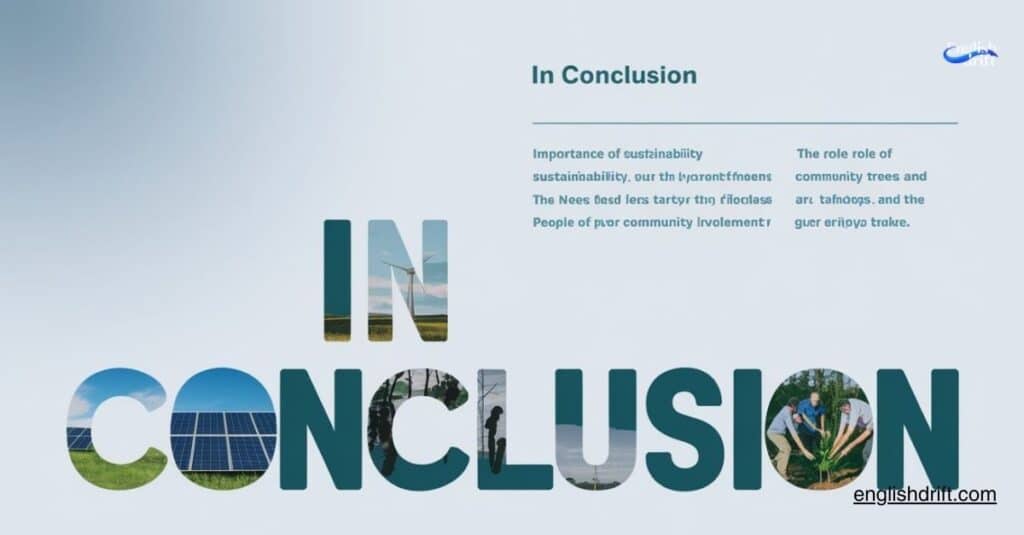Looking for a fresh synonym for in conclusion to wrap up your writing? Using “in conclusion” can feel repetitive and flat, especially if it’s overused. Luckily, there are plenty of other ways to say in conclusion that sound polished and engaging. In this guide, we’ll explore 19 in conclusion synonym options that keep your writing professional, varied, and memorable.
Why Finding Alternatives to “In Conclusion” Matters
Choosing varied and effective conclusion phrases serves several purposes:
- Prevents Repetition: Using “in conclusion” over and over again makes writing feel predictable.
- Enhances Flow: Alternatives can help transition smoothly from one point to the next.
- Engages the Reader: A unique closing phrase catches the reader’s attention and makes the writing feel polished.
- Sets the Tone: Different phrases can convey a range of tones, from formal to conversational, allowing you to adapt to the audience or subject matter.
Whether you’re crafting a formal report, casual blog post, or academic essay, having alternative phrases helps to keep writing dynamic and effective.
When to Use Alternatives to “In Conclusion”
Consider the type of content, the tone, and your audience. Formal alternatives are better suited for academic writing, business reports, and research papers. Casual alternatives are perfect for blog posts, social media, and speeches where a conversational tone is needed. Using the right phrase depends on the purpose of your writing and the effect you want to leave on the reader.
Let’s now look at 19 powerful alternatives to “in conclusion” with examples for each, helping you to choose the right phrase for any writing context.
In Conclusion Synonym: 19 Powerful Alternatives
- In Summary
- To Summarize
- Ultimately
- In Closing
- In a Nutshell
- To Wrap Things Up
- All in All
- On a Final Note
- Last but Not Least
- Long Story Short
- For These Reasons
- To Conclude
- Therefore
- In Brief
- After All Is Said and Done
- To Summarize Briefly
- With This in Mind
- As a Final Thought
- In the End
19 Other Ways to Say In Conclusion (With Practical Examples)

1. In Summary
In Summary provides a straightforward way to wrap up key points. This phrase works well in both formal and informal settings, making it a versatile alternative to “in conclusion.”
- Example: “In summary, the data shows that sustainable practices increase both efficiency and profit margins.”
2. To Summarize
To Summarize offers a direct, no-nonsense ending that clearly signals the final thoughts.
- Example: “To summarize, renewable energy investments are crucial for a sustainable future.”
3. Ultimately
Ultimately is a great choice when you want to underline a main idea or key takeaway after presenting an argument or analysis.
- Example: “Ultimately, the research supports the need for universal healthcare policies.”
4. In Closing
In Closing is ideal for speeches or presentations where you’re speaking directly to the audience.
- Example: “In closing, remember that teamwork and collaboration drive innovation.”
5. In a Nutshell
In a Nutshell is a concise, slightly casual way to sum up. It’s well-suited to informal contexts like blog posts or conversations.
- Example: “In a nutshell, consistent exercise benefits both physical and mental health.”
6. To Wrap Things Up
This phrase has a conversational tone and is often used in summaries for informal or instructional content.
- Example: “To wrap things up, follow these steps to achieve faster project completion.”
7. All in All
All in All has a relaxed feel and works well for summarizing multiple points while highlighting the overall message.
- Example: “All in all, effective time management is key to balancing work and life.”
8. On a Final Note
On a Final Note is a thoughtful, slightly formal way to close that leaves readers with a concluding idea or message.
- Example: “On a final note, our company remains committed to sustainability and community growth.”
9. Last but Not Least
Use Last but Not Least to underscore an important final thought, emphasizing that it’s as significant as previous points.
- Example: “Last but not least, let’s prioritize mental well-being in our workplace policies.”

10. Long Story Short
This phrase works especially well when distilling complex information into a brief conclusion.
- Example: “Long story short, consistent monitoring and adjustments are essential to any project’s success.”
11. For These Reasons
For These Reasons is a common phrase in argumentative writing, helping to tie together supporting evidence.
- Example: “For these reasons, the proposed policy should be implemented without delay.”
12. To Conclude
Simple and direct, To Conclude works well in formal settings like essays, reports, or speeches.
- Example: “To conclude, our findings underscore the importance of investing in education.”
12. Therefore
Therefore is effective for closing an analytical or logical piece where you’re building towards a final insight.
- Example: “Therefore, embracing technology in classrooms can enhance the learning experience.”
14. In Brief
In Brief is a useful phrase for summarizing succinctly and effectively, especially when keeping the closing concise.
- Example: “In brief, balanced nutrition and regular exercise lead to improved overall health.”
15. After All Is Said and Done
A slightly informal choice, this phrase can be used to conclude after a detailed or lengthy discussion.
- Example: “After all is said and done, trust and transparency are the foundation of successful teams.”
16. To Summarize Briefly
This phrase signals a quick wrap-up of core ideas without unnecessary elaboration.
- Example: “To summarize briefly, our goals are within reach with effective planning.”
17. With This in Mind
With This in Mind ties your conclusion to the main themes and prepares the reader for further action or thought.
- Example: “With this in mind, let’s proceed confidently toward achieving our goals.”
18. As a Final Thought
Use As a Final Thought to leave readers with a lasting idea or piece of wisdom.
- Example: “As a final thought, remember that change starts with small actions.”
19. In the End
In the End summarizes by focusing on the ultimate outcome or lesson.
- Example: “In the end, perseverance and resilience will help us overcome any challenge.”
Using “In Conclusion” Alternatives in Different Contexts
Here’s how different alternatives fit in various writing contexts:
| Context | Suitable Alternatives | Style |
|---|---|---|
| Academic Writing | Ultimately, Therefore, To Conclude | Formal |
| Business Reports | In Summary, In Closing, For These Reasons | Formal |
| Blog Posts | In a Nutshell, Long Story Short, All in All | Casual/Conversational |
| Presentations | On a Final Note, In Closing, Last but Not Least | Direct |
FAQs About “In Conclusion” Synonyms
When should I use these alternatives?
Use alternatives when you want to add variety to your writing, particularly in longer documents or discussions where “in conclusion” may feel repetitive.
Which options work best in formal vs. informal contexts?
For formal contexts, options like To Conclude, Therefore, and Ultimately work best. Informal settings benefit from alternatives like In a Nutshell and Long Story Short.
Can I use these phrases in any type of writing?
Yes, but be mindful of the tone and audience. For academic and professional documents, stick to formal alternatives. Casual options work well in blogs or personal essays.
Final Thoughts on Choosing the Right Closing Phrase
Mastering the right in conclusion synonym can elevate your writing and leave a strong impression on readers. Whether you need a formal synonym for in conclusion for an academic essay or a more casual way to summarize, choosing varied phrases keeps your message clear and engaging. By using these other ways to say in conclusion, you’ll add depth, avoid repetition, and ensure each piece ends on a memorable note.
READ MORE
- Thank You for Welcoming Me to the Team: 60+ Messages
- how to respond to make me : 60+ Replies You Need Right Now!
- 23 Professional Alternatives to “Happy to Help” (With Examples
- thanks for inviting me : 50+ Messages
- how to say thank you for an unexpected gift : 100+ Massages
- Thank You for Your Patience : 50+ Messages

Henry James is an experienced blogger at English Drift, specializing in English grammar and vocabulary. With a passion for language and clear communication, Henry helps readers enhance their writing skills through insightful guides and practical tips.







